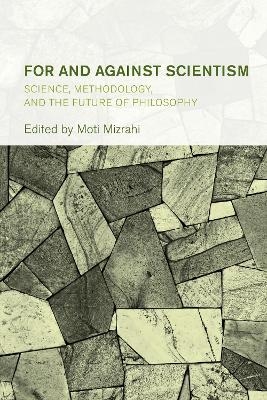
For and Against Scientism
Science, Methodology, and the Future of Philosophy
Seiten
2024
Rowman & Littlefield (Verlag)
978-1-5381-6335-1 (ISBN)
Rowman & Littlefield (Verlag)
978-1-5381-6335-1 (ISBN)
Does scientism pose an existential threat to philosophy, as some philosophers think, or is it a way to make philosophy as ‘successful’ as science? This book intends is to put forward a fruitful dialogue about scientism and its implications for the future of philosophy as an academic discipline.
The term “scientism” is used in several ways. It is used to denote an epistemological thesis according to which science is the source of our knowledge about the world and ourselves. Relatedly, it is used to denote a methodological thesis according to which the methods of science are superior to the methods of non-scientific fields or areas of inquiry. It is also used to put forward a metaphysical thesis that what exists is what science says exists. In recent decades, the term “scientism” has acquired a derogatory meaning when it is used in defense of non-scientific ways of knowing. In particular, some philosophers level the charge of “scientism” against those (mostly scientists) who are dismissive of philosophy. Other philosophers, however, embrace scientism, or some variant thereof, and object to the pejorative use of the term. This book critically examines arguments for and against different varieties of scientism in order to answer the central question: Does scientism pose an existential threat to academic philosophy? Or should philosophy become more scientific?
The term “scientism” is used in several ways. It is used to denote an epistemological thesis according to which science is the source of our knowledge about the world and ourselves. Relatedly, it is used to denote a methodological thesis according to which the methods of science are superior to the methods of non-scientific fields or areas of inquiry. It is also used to put forward a metaphysical thesis that what exists is what science says exists. In recent decades, the term “scientism” has acquired a derogatory meaning when it is used in defense of non-scientific ways of knowing. In particular, some philosophers level the charge of “scientism” against those (mostly scientists) who are dismissive of philosophy. Other philosophers, however, embrace scientism, or some variant thereof, and object to the pejorative use of the term. This book critically examines arguments for and against different varieties of scientism in order to answer the central question: Does scientism pose an existential threat to academic philosophy? Or should philosophy become more scientific?
Moti Mizrahi is associate professor of philosophy at the Florida Institute of Technology. He is the author of The Relativity of Theory: Key Positions and Arguments in the Contemporary Scientific Realism/Antirealism Debate (2020) and the editor of The Kuhnian Image of Science: Time for a Decisive Transformation? (2018).
| Erscheinungsdatum | 09.01.2024 |
|---|---|
| Reihe/Serie | Collective Studies in Knowledge and Society |
| Verlagsort | Lanham, MD |
| Sprache | englisch |
| Maße | 152 x 228 mm |
| Gewicht | 327 g |
| Themenwelt | Geisteswissenschaften ► Philosophie ► Erkenntnistheorie / Wissenschaftstheorie |
| Geisteswissenschaften ► Philosophie ► Ethik | |
| Naturwissenschaften | |
| ISBN-10 | 1-5381-6335-7 / 1538163357 |
| ISBN-13 | 978-1-5381-6335-1 / 9781538163351 |
| Zustand | Neuware |
| Haben Sie eine Frage zum Produkt? |
Mehr entdecken
aus dem Bereich
aus dem Bereich
die Grundlegung der modernen Philosophie
Buch | Softcover (2023)
C.H.Beck (Verlag)
18,00 €
Buch | Softcover (2023)
Reclam, Philipp (Verlag)
7,00 €


![Was heißt Denken?. Vorlesung Wintersemester 1951/52. [Was bedeutet das alles?] - Martin Heidegger](/media/113619842)